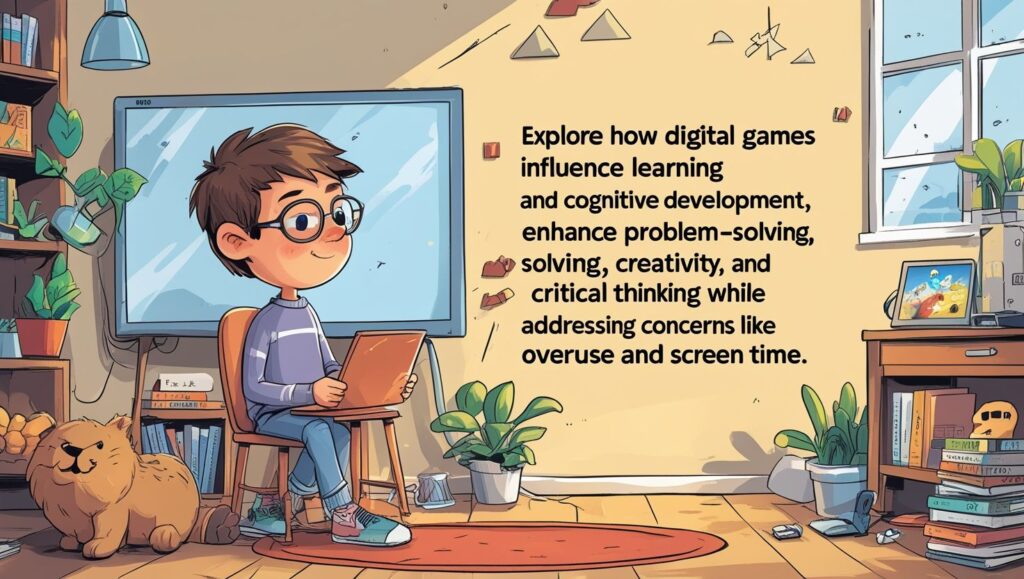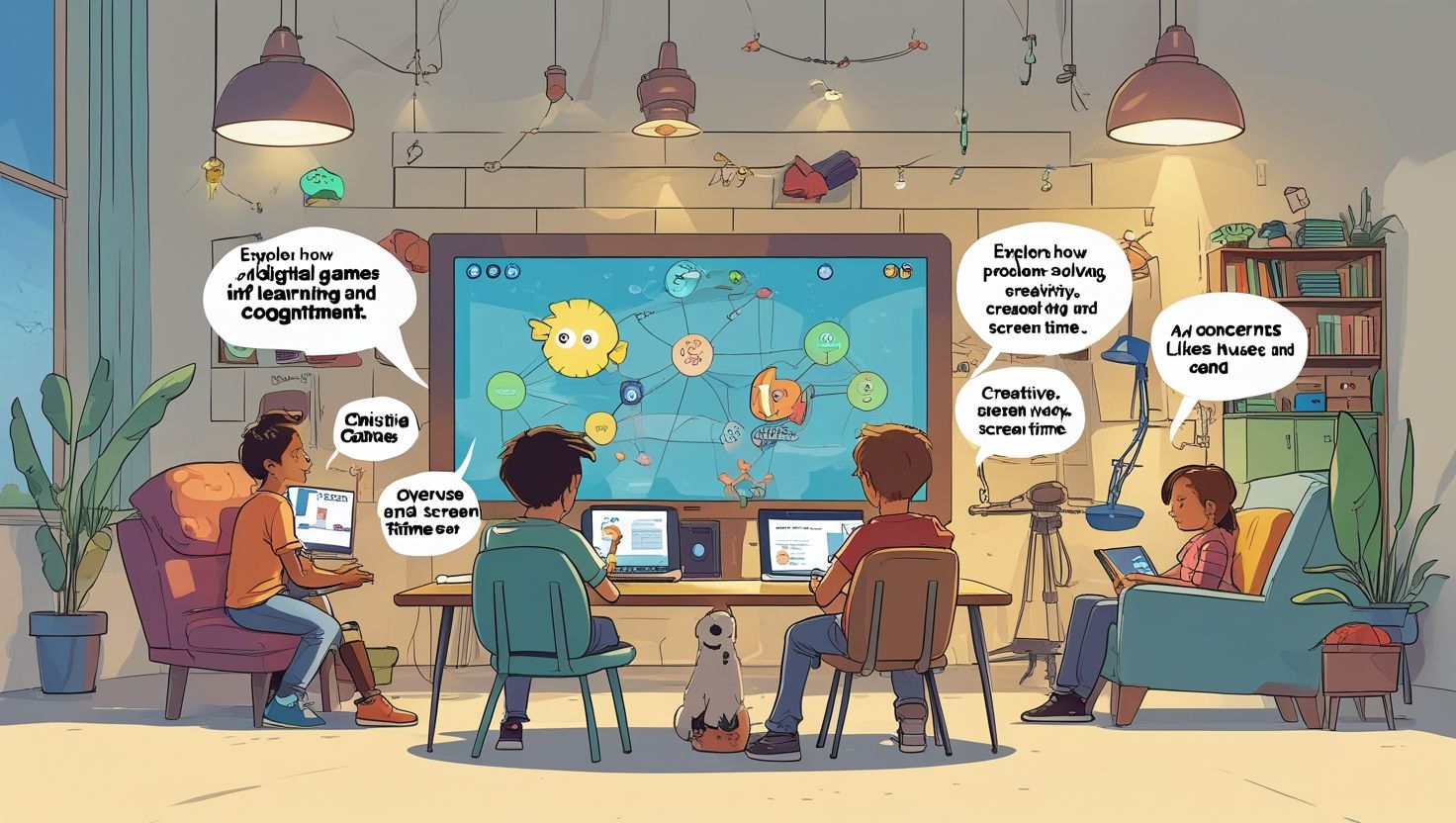Impact of Digital Games on Learning and Thinking, Digital games have become an integral part of modern life, significantly influencing how individuals, especially children and adolescents, learn and think. With the increasing integration of technology in education, digital games are no longer seen merely as entertainment but as valuable tools for cognitive and skill development. This article explores the impact of digital games on learning and thinking, emphasizing their benefits, challenges, and potential for enhancing educational experiences.
Benefits of Digital Games on Learning
1. Enhancing Cognitive Skills
Digital games often involve problem-solving, decision-making, and critical thinking, fostering cognitive growth. Puzzle games, for example, improve spatial reasoning and memory, while strategy games develop planning and analytical skills. These activities challenge players to think critically and adapt to changing scenarios.
2. Promoting Engagement
Learning through digital games is interactive and immersive, keeping students engaged for extended periods. Unlike traditional learning methods, which can be monotonous, games provide immediate feedback and rewards, motivating players to improve their performance.
3. Encouraging Collaborative Learning
Multiplayer games promote teamwork and collaboration as players must communicate, strategize, and achieve common goals. These skills translate into real-world scenarios, enhancing interpersonal and cooperative abilities.
4. Developing Technological Proficiency
Exposure to digital games enhances technological literacy. Navigating interfaces, understanding mechanics, and utilizing digital tools prepare students for a tech-driven future.
5. Facilitating Personalized Learning
Many educational games are designed to cater to individual learning paces and styles. Adaptive algorithms adjust difficulty levels, ensuring that learners remain challenged without becoming frustrated.
Impact on Thinking
1. Improved Decision-Making
Games often require players to make quick decisions under pressure, improving their ability to analyze situations and make sound judgments. This skill is particularly evident in action and strategy games, where split-second choices determine success.
2. Boosting Creativity
Sandbox and simulation games like Minecraft encourage creativity by allowing players to design, build, and experiment. This freedom fosters innovative thinking and problem-solving abilities.
3. Sharpening Focus and Attention
Many games require sustained concentration to achieve objectives, which can enhance attention spans. Players learn to focus on tasks, filter out distractions, and prioritize actions effectively.
4. Developing Logical and Strategic Thinking
Strategy games require logical reasoning, planning, and predicting outcomes. Players develop the ability to think several steps ahead, honing their strategic thinking capabilities.
5. Encouraging Resilience and Persistence
Games often include challenges that require repeated attempts to overcome. This teaches players resilience, persistence, and the ability to learn from failure, valuable traits for academic and personal growth.
Challenges and Concerns
While digital games have numerous benefits, there are also challenges associated with their use in learning and thinking:
1. Risk of Addiction
Excessive gaming can lead to dependency, negatively affecting academic performance, social interactions, and physical health.
2. Content Concerns
Not all games are educational; some may contain violent or inappropriate content, which can influence behavior and attitudes negatively.
3. Digital Divide
Access to digital games and devices is not universal, potentially widening the gap between privileged and underprivileged students.
4. Overemphasis on Rewards
Some games focus heavily on extrinsic rewards, which might undermine intrinsic motivation for learning.
5. Health Issues
Extended screen time associated with gaming can lead to eye strain, sedentary lifestyles, and related health problems.

Integrating Digital Games in Education
To maximize the benefits of digital games, educators and parents should consider the following strategies:
1. Choosing Educational Games
Select games that align with learning objectives and promote cognitive and skill development. Examples include math puzzles, language learning apps, and historical simulations.
2. Setting Limits
Establish boundaries for screen time to ensure a healthy balance between gaming, academics, and physical activities.
3. Encouraging Critical Evaluation
Teach students to critically evaluate game content and reflect on the skills they acquire during gameplay.
4. Collaborative Play
Encourage group gaming activities that foster teamwork, communication, and shared learning experiences.
5. Integrating Games into Curriculum
Educators can incorporate game-based learning into the curriculum to make lessons more engaging and interactive. For instance, gamified quizzes and simulations can enhance understanding of complex topics.
Future of Digital Games in Learning
The future of digital games in education is promising. Advances in technology, such as virtual reality (VR) and augmented reality (AR), are set to revolutionize learning by offering immersive experiences. These technologies can simulate real-world environments, enabling learners to practice skills in a controlled setting.
Furthermore, artificial intelligence (AI) can make games more adaptive, providing personalized learning paths and feedback. This integration of gaming with cutting-edge technologies will create innovative opportunities for education, making it more accessible, engaging, and effective.
Conclusion
Digital games have a profound impact on learning and thinking, enhancing cognitive skills, engagement, and creativity. While challenges such as addiction and content concerns exist, these can be mitigated through mindful use and integration into educational contexts. By embracing the potential of digital games, educators and parents can provide learners with enriching experiences that prepare them for the demands of the modern world. With careful planning and innovation, digital games will continue to transform the educational landscape, making learning an exciting and impactful journey.

13 thoughts on “Impact of Digital Games on Learning and Thinking”
Comments are closed.